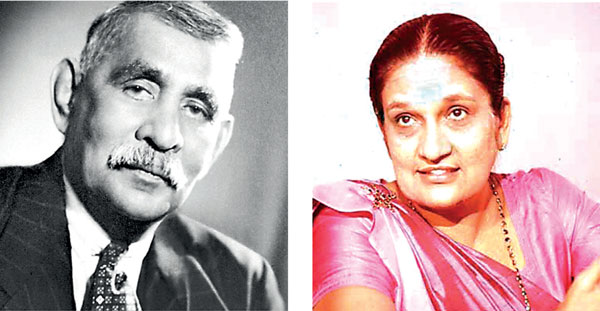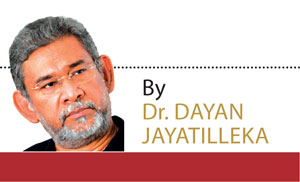Reply To:
Name - Reply Comment
Last Updated : 2024-04-19 14:00:00

 If Pakistan had been our neighbour and we had Muslim majority provinces, we would probably have had a complex and troubled relationship with Pakistan and unstinted friendship with India, but our geographic destiny was otherwise.
If Pakistan had been our neighbour and we had Muslim majority provinces, we would probably have had a complex and troubled relationship with Pakistan and unstinted friendship with India, but our geographic destiny was otherwise.
Prudent, pragmatic leaders of Sri Lanka, beginning with DS Senanayake, always tried to balance off our great neighbour, because of the potential/latent threat from Tamil Nadu and its effect/influence on the Tamil populace of the island.
With the South Asian region splitting in 1971, Prime Minister Sirimavo Bandaranaike resisted heavy parliamentary pressure from her powerful coalition partners, the pro-Soviet Communist party and the pro-Bengali Indophile LSSP, to support the ethically sound cause of the birth of Bangladesh. The (then) influential Daily News argued editorially that Ceylon should temporarily “tilt to the Islamabad–Beijing axis” as its national interests would be jeopardized by the successful precedent of secession under Indian auspices.
There was a joke doing the rounds in DPL circles in Colombo, sourced to an exchange between a High Commissioner and the Editor of the Daily News. “Question: When will Colombo recognize an independent Bangladesh? Answer: After the last country in South Asia does so.”
The very next year (1972), writing in the quality Indian press about rising Tamil secessionist nationalism, Prof. Urmila Phadnis, the doyenne of Delhi’s Lankanologists, warned prophetically of a “Tamil Bangla in Sri Lanka”.
As PM-cum-Minister of Defence and External Affairs, Madam Bandaranaike had an astute, coldly realistic grasp of geopolitics and our national interest.
A lucid Realism would have led Colombo to be the last to be seen to head for the exits over the SAARC summit scheduled to be held in Islamabad this year. Instead it was one of the first to trigger the collective exit by invoking the argument of unsuitability of the environment. What this and the earlier co-sponsorship of the US resolution in Geneva 2015 demonstrate is that the present administration has become a tame, timid, fellow traveller of India and the West, irrespective of the imperatives of balance as dictated by national interest.
When Prime Minister Tony Blair ignored British public sentiment and interests and waded into Iraq with President Bush invoking the “special relationship” with the USA, he was dubbed a ‘poodle’ of the US. When our current Prime Minister’s father advised Sir John Kotelawela, Ceylon played a similar role in Bandung in 1955, which contributed to the UNP’s electoral demise a year later, rendering it a one-term administration. The present Sri Lankan government risks being perceived as a “poodle” co-owned and shared by both the US and India (or the Indo-
US axis).
When the airdrop of 1987 took place preventing an early military defeat of the LTTE (an episode which Maj. Gen. Kamal Gunaratne refers to in his book as, “a rape of our airspace”), we were far more isolated internationally and infinitely more vulnerable than Pakistan is today. Minister Ranil Wickremesinghe was dispatched by President Jayewardene to Pakistan and China to seek support -- evidence of who/where we turned to in the direst need. Unprovoked betrayal of a reliable ally, partner and friend is never smart policy.
The PM’s characteristically cavalier remark that if SAARC doesn’t get its act together Sri Lanka would have to look at other options, isn’t the smartest of stances either. By contrast, Dr. Iftekar Ahmed Chowdhury, the sagacious scholar-diplomat and former Foreign Minister of Bangladesh, the birthplace of the idea SAARC, had this to conclude:
“Few South Asians, if any, see the benefit of burying SAARC forever...That being so it would be unwise to bring about the demise of SAARC even if there are periods of severe strain in intramural relationships in the region. SAARC is an organization whose ownership belongs to the peoples rather than to the governments. The Sikh pilgrim to the gurdwaras of Lahore would vouchsafe for that. If SAARC leaders, politicians or generals cannot meet for ‘reasons of State’, there is no reason why their writers, artists and thinkers should not. SAARC’s achievements in politics or economics might not come anywhere close to that of the European Union or even the Association of Southeast Asian Nations, but it has given the South Asian a sense of identity , both in the region, and increasingly so among its diaspora abroad. Given the nature of State-formation in South Asia, there will always be the problem of the adjustment as to the stressing of commonalities vis-a-vis the underscoring of distinctiveness. The commonality enables the people to share an ethos, and the distinctiveness justifies separate sovereignties. Both for India and Pakistan, the inability of a group of nations or sub-nations in the region to hold together could have far-reaching ramifications.”
(“SAARC in Shambles? The Future of Regional Cooperation in South Asia”, ISAS Insights)
Looking beyond this regional issue, it is worrying that the Prime Minister has forgotten the basic lessons that the UNP repeatedly learns only to forget:
(A) The West and India turn out in the final analysis, to be electorally expensive allies (or liabilities) because the Tamil Nadu and Tamil Diaspora factors make India and the West push for reforms of such magnitude that the Sinhala support base of the UNP led regime shrinks.
(B) Alliances with Tamil nationalists which carry the UNP into power or help it form coalition governments also serve to turn these governments into one term administrations precisely because those Tamil allies ratchet up their political demands to the point that they damage the UNP by midterm and sink it electorally at the end of the first term.
As in 1952-1956, 1965-1970 and 2001-2004, this UNP-led coalition is looking unmistakably like a one-term wonder, if it doesn’t trigger an ‘Arab Spring’ or Hartal ’53 sooner.
Further evidence lies in the Foreign Minister’s refusal to rule out federalism and reiterate a commitment to unitary parameters at a September 25 event in LA, according to veteran journalist Hassina Leelaratna (widow of Deeptha Leelaratne, also a well-known newspaperman). In a noteworthy piece entitled “Mangala in Los Angeles: Says no separation but leaves door open for federalism”, she reports: ‘“A federal state is not a separate state. I assure you Sri Lanka will remain a united, undivided country,” he said…The minister was responding to my question as to whether the government would continue to uphold a unitary constitution “and avoid a federal state.” …In contrast to other Sri Lankan leaders who from time to time have addressed the expatriate community here, Mr. Samaraweera, speaking for about 20 minutes, solely in English, did not have one good thing to say about Sri Lanka from independence to present. None of the warm nostalgia for the homeland usually evoked by leaders from all sides of the political divide. Quoting extensively from the late Lee Kuan Yew, founder and prime minister of Singapore, he painted a grim picture of “a country that couldn’t evolve”… …
Emphasizing that the island will be a strategic military hub in the Indian Ocean and a gateway to Asia…he said the government will take measures to make it easier for foreign nationals to buy land… …Reconciliation was key to coming to terms with the “tragedies of the past” which was why, he said, the government felt it important to “show the world” its commitment by cosponsoring the Geneva Resolution…’(Report and photos by Hassina Leelaratna, http://srilankaexpress. org/ms) In the meanwhile, the PM has promised to sign ETCA by year end, explaining that it would mean a massive infusion of Tamil Nadu and South Indian capital into this island, i.e. chunks of our economy can be bought and controlled by Tamil Nadu. He also had discussions with Indian Minister of Highways and Railways, Nitin “Hanuman Bridge” Gadkari about a network of highways linking the North and East of Sri Lanka with Colombo and Anuradhapura. Hanuman never had it so easy.

Add comment
Comments will be edited (grammar, spelling and slang) and authorized at the discretion of Daily Mirror online. The website also has the right not to publish selected comments.
Reply To:
Name - Reply Comment
On March 26, a couple arriving from Thailand was arrested with 88 live animal
According to villagers from Naula-Moragolla out of 105 families 80 can afford
Is the situation in Sri Lanka so grim that locals harbour hope that they coul
A recent post on social media revealed that three purple-faced langurs near t